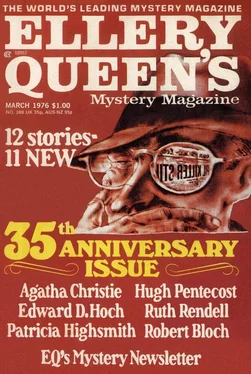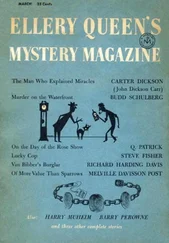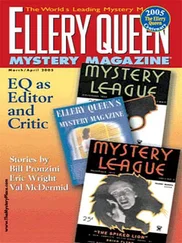Аврам Дэвидсон - Ellery Queen’s Mystery Magazine. Vol. 67, No. 3. Whole No. 388, March 1976
Здесь есть возможность читать онлайн «Аврам Дэвидсон - Ellery Queen’s Mystery Magazine. Vol. 67, No. 3. Whole No. 388, March 1976» весь текст электронной книги совершенно бесплатно (целиком полную версию без сокращений). В некоторых случаях можно слушать аудио, скачать через торрент в формате fb2 и присутствует краткое содержание. Город: New York, Год выпуска: 1976, Издательство: Davis Publications, Жанр: Детектив, на английском языке. Описание произведения, (предисловие) а так же отзывы посетителей доступны на портале библиотеки ЛибКат.
- Название:Ellery Queen’s Mystery Magazine. Vol. 67, No. 3. Whole No. 388, March 1976
- Автор:
- Издательство:Davis Publications
- Жанр:
- Год:1976
- Город:New York
- ISBN:нет данных
- Рейтинг книги:5 / 5. Голосов: 1
-
Избранное:Добавить в избранное
- Отзывы:
-
Ваша оценка:
- 100
- 1
- 2
- 3
- 4
- 5
Ellery Queen’s Mystery Magazine. Vol. 67, No. 3. Whole No. 388, March 1976: краткое содержание, описание и аннотация
Предлагаем к чтению аннотацию, описание, краткое содержание или предисловие (зависит от того, что написал сам автор книги «Ellery Queen’s Mystery Magazine. Vol. 67, No. 3. Whole No. 388, March 1976»). Если вы не нашли необходимую информацию о книге — напишите в комментариях, мы постараемся отыскать её.
Ellery Queen’s Mystery Magazine. Vol. 67, No. 3. Whole No. 388, March 1976 — читать онлайн бесплатно полную книгу (весь текст) целиком
Ниже представлен текст книги, разбитый по страницам. Система сохранения места последней прочитанной страницы, позволяет с удобством читать онлайн бесплатно книгу «Ellery Queen’s Mystery Magazine. Vol. 67, No. 3. Whole No. 388, March 1976», без необходимости каждый раз заново искать на чём Вы остановились. Поставьте закладку, и сможете в любой момент перейти на страницу, на которой закончили чтение.
Интервал:
Закладка:
“Sounds pretty far-fetched if you ask me.”
“Exactly.” Kane smiled. “But there are other candidates, equally improbable. Montague John Druitt for one, a barrister of unsound mind who drowned himself in the Thames shortly after the last Ripper murder. Unfortunately, it has been established that he was living in Bournemouth, and on the days before and after the final slaying he was there, playing cricket. Then there was the Duke of Clarence—”
“Who?”
“Queen Victoria’s grandson in direct line of succession to the throne.”
“Surely you’re not serious?”
“No, but others are. It has been asserted that Clarence was a known deviate who suffered from insanity as the result of venereal infection, and that his death in 1892 was actually due to the ravages of his disease.”
“But that doesn’t prove him to be the Ripper.”
“Quite so. It hardly seems possible that he could write the letters filled with American slang and crude errors in grammar and spelling which the Ripper sent to the authorities; letters containing information which could be known only by the murderer and the police. More to the point, Clarence was in Scotland at the time of one of the killings and at Sandringham when others took place. And there are equally firm reasons for exonerating suggested suspects close to him — his friend James Stephen and his physician, Sir William Gull.”
“You’ve really studied up on this,” Woods murmured. “I’d no idea you were so keen on it.”
“And for good reason. I wasn’t about to make a fool of myself by advancing an untenable notion. I don’t believe the Ripper was a seaman, as some surmise, for there’s not a scintilla of evidence to back the theory. Nor do I think the Ripper was a slaughterhouse worker, a midwife, a man disguised as a woman, or a London bobby. And I doubt the very existence of a mysterious physician named Dr. Stanley, out to avenge himself against the woman who had infected him, or his son.”
“But there do seem to be a great number of medical men amongst the suspects,” Woods said.
“Right you are, and for good reason. Consider the nature of the crimes — the swift and skillful removal of vital organs, accomplished in the darkness of the streets under constant danger of imminent discovery. All this implies the discipline of someone versed in anatomy, someone with the cool nerves of a practising surgeon. Then too there’s the matter of escaping detection. The Ripper obviously knew the alleys and byways of the East End so thoroughly that he could slip through police cordons and patrols without discovery. But if seen, who would have a better alibi than a respectable physician, carrying a medical bag on an emergency call late at night?
“With that in mind, I set about my search, examining the rolls of London Hospital in Whitechapel Road. I went over the names of physicians and surgeons listed in the Medical Registry for that period.”
“All of them?”
“It wasn’t necessary. I knew what I was looking for — a surgeon who lived and practised in the immediate Whitechapel area. Whenever possible, I followed up with a further investigation of my suspects’ histories — researching hospital and clinic affiliations, even hobbies and background activities from medical journals, press reports, and family records. Of course, all this takes a great deal of time and patience. I must have been tilting at this windmill for a good five years before I found my man.”
Woods glanced at the nameplate on the bag. “J. Ridley, M.D.?”
“John Ridley. Jack, to his friends — if he had any.” Kane paused, thoughtful. “But that’s just the point. Ridley appears to have had no friends, and no family. An orphan, he received his degree from Edinburgh in 1878, ten years before the date of the murders. He set up private practise here in London, but there is no office address listed. Nor is there any further information to be found concerning him; it’s as though he took particular care to suppress every detail of his personal and private life. This, of course, is what roused my suspicions. For an entire decade J. Ridley lived and practised in the East End without a single mention of his name anywhere in print, except for his Registry listing. And after 1888, even that disappeared.”
“Suppose he died?”
“There’s no obituary on record.”
Woods shrugged. “Perhaps he moved, emigrated, took sick, abandoned practise?”
“Then why the secrecy? Why conceal his whereabouts? Don’t you see — it’s the very lack of such ordinary details which leads me to suspect the extraordinary.”
“But that’s not evidence. There’s no proof that your Dr. Ridley was the Ripper.”
“That’s why this is so important.” Kane indicated the bag on the tabletop. “If we knew its history, where it came from—”
As he spoke, Kane reached down and picked up a brass letter-opener from the table, then moved to the bag.
“Wait.” Woods put a restraining hand on Kane’s shoulder. “That may not be necessary.”
“What do you mean?”
“I think the shopkeeper was lying. He knew what the bag contains — he had to, or else why did he fix such a ridiculous price? He never dreamed you’d take him up on it, of course. But there’s no need for you to force the lock any more than there was for him to do so. My guess is that he has a key.”
“You’re right.” Kane set the letter-opener down. “I should have realized, if I’d taken the time to consider his reluctance. He must have the key.” He lifted the shiny bag and turned. “Come along — let’s get back to him before the shop closes. And this time we won’t be put off by any excuses.”
Dusk had descended as Kane and his companion hastened through the streets, and darkness was creeping across the deserted silence of Saxe-Coburg Square when they arrived.
They halted then, staring into the shadows, seeking the spot where the shop nestled between the residences looming on either side. The shadows were deeper here and they moved closer, only to stare again at the empty gap between the two buildings.
The shop was gone.
Woods blinked, then turned and gestured to Kane. “But we were here — we saw it—”
Kane didn’t reply. He was staring at the dusty, rubble-strewn surface of the space between the structures; at the weeds which sprouted from the bare ground beneath. A chill night wind echoed through the emptiness. Kane stooped and sifted a pinch of dust between his fingers. The dust was cold, like the wind that whirled the fine grains from his hand and blew them away into the darkness.
“What happened?” Woods was murmuring. “Could we both have dreamed—”
Kane stood erect, facing his friend. “This isn’t a dream,” he said, gripping the black bag.
“Then what’s the answer?”
“I don’t know.” Kane frowned thoughtfully. “But there’s only one place where we can possibly find it.”
“Where?”
“The 1888 Medical Registry lists the address of John Ridley as Number 17 Dorcas Lane.”
The cab which brought them to Dorcas Lane could not enter its narrow accessway. The dim alley beyond was silent and empty, but Kane plunged into it without hesitation, moving along the dark passage between solid rows of grimy brick. Treading over the cobblestones, it seemed to Woods that he was being led into another era, yet Kane’s progress was swift and unfaltering.
“You’ve been here before?” Woods said.
“Of course.” Kane halted before the unlighted entrance to Number 17, then knocked.
The door opened — not fully, but just enough to permit the figure behind it to peer out at them. Both glance and greeting were guarded.
“Whatcher want?”
Kane stepped into the fan of light from the partial opening. “Good evening. Remember me?”
Читать дальшеИнтервал:
Закладка:
Похожие книги на «Ellery Queen’s Mystery Magazine. Vol. 67, No. 3. Whole No. 388, March 1976»
Представляем Вашему вниманию похожие книги на «Ellery Queen’s Mystery Magazine. Vol. 67, No. 3. Whole No. 388, March 1976» списком для выбора. Мы отобрали схожую по названию и смыслу литературу в надежде предоставить читателям больше вариантов отыскать новые, интересные, ещё непрочитанные произведения.
Обсуждение, отзывы о книге «Ellery Queen’s Mystery Magazine. Vol. 67, No. 3. Whole No. 388, March 1976» и просто собственные мнения читателей. Оставьте ваши комментарии, напишите, что Вы думаете о произведении, его смысле или главных героях. Укажите что конкретно понравилось, а что нет, и почему Вы так считаете.












